by Abby Koch – “There are a mind-boggling number of comics being produced by both mainstream and independent publishers,” wrote Professor Elizabeth Coody in her portion for the Student Undergraduate Research Program (SURP). “And with a few exceptions, they are notoriously difficult to search for and within. Scholars need a way to find new examples of sacred texts and comics to further larger scholarly projects, but they often do not have the capacity to find what they need ( or even to know what is out there).”
Coody, along with the applications of sophomore Alexandra Inskeep and junior Keonté Robertson, waited in anticipation if their project would be approved. What made their application different was their relation to pop culture, religion, and the collection they wanted to build.
Weeks passed before they heard news from the SURP committee. The trio was approved to create a database of comic books with religious themes over the summer to help scholars and their research.
The idea to create the comic book database formed in 2017, when Coody attended an interdisciplinary academic conference in 2017 on the theme “Monstrous Women in Comics.”
“I met scholars Pauline Reynolds and Sara Durazo-DeMoss who had been busy cataloging examples of college and representations of higher education in comics,” said Coody “They had created a simple database of these examples and it helped them find their topic for their paper there that later became a chapter in the book that the conference organizer and I edited. I saw how really fruitful just having the information cataloged in front of you can be — but I also immediately realized that this was a huge undertaking to do with comics and sacred texts.”
Coody felt like it would take a large number of people to take on the creation of a broad collection of references. She would later on hear about SURP, which would help get students be a part of the project. Coody then reached out to a number of religious studies and computer science majors to see who would be interested in such a project.
SURP takes place during the summer and offers students with the opportunity to research extensively on a topic alongside a faculty advisor as a collaborative effort. The program allows students to live on campus for free, a stipend for student and professor, and with additional monetary help, if needed, for equipment or for travel. Students are required by the end of the program to present their findings through an original intellectual or creative contribution to the discipline.
Inskeep, a religious studies major, and Robertson, a computer studies major, joined the project and submitted applications to SURP. “I was excited to work with Keonté and Dr. Coody all summer and read comic books,” said Inskeep. “I was a little nervous because of COVID had just popped up, but it hadn’t become a huge thing.”
COVID-19 began affecting Morningside life during the start of spring break during early March. Classes went fully online soon after and students were given notice to clear the dorms. A majority of the summer programs, like May terms and SURP, were cancelled or found socially distanced solutions.
The trio decided to work remotely on the project, utilizing Google Meet and Whatsapp to keep in communication with each other. “[COVID-19] also limited our communication since we weren’t going to be able to meet as a group in person,” said Robertson. “We used the power of the internet to solve many of our issues. But nothing can replace meeting together and being able to work at the same pace.”
COVID-19 had an effect on Inskeep and Robertson’s final presentation, which had to be presented through Zoom. The team had to cancel the presentation trip to Denver Comic-Con due to the pandemic as well. “The Denver Con has a special emphasis on education and the power of comics in education that fits really nicely with our work. It would have been so wonderful to have the chance to talk about our work with scholars and comics as we were getting started,” said Coody. “Sure, we did a lot of emailing with people I know, but nothing beats the chance to stand in a room full of comics nerds and talk about this!”
Days started out with the team video chatting with one another, catching up on what tasks needed to be completed or informing what problems they found. They would also keep track of what each person would be working on throughout the week.
Work was split with the database website being created by Robertson and the reading and writing more in the hands of Inskeep. Coody helped with both areas and answering any questions that either student had.
“I would pretty much sit at the computer and brainstorm and code all day,” said Robertson. “There were those late-night days, where I would have a happy “eureka” moment where I would solve an issue and code until I drop.”
“I was more of the reader and reporter. I read, analyzed, and wrote down what I came across,” said Inskeep. “In the beginning I was also a researcher, with researching different databases to help us with ideas.”
With building off of the comic books that they saw had a connection to sacred texts, the team sent out a request for recommendations through email and social media. Recommendations ranged from amateur comic collectors to scholars. “We had a lot of great recommendations. Andrew Tooze was one of the people who got back to us and he had been doing his research in religion in comics,” said Robertson. “He sent over a google document of many of the instances he had found. His contribution helped get the database filled with great submissions.”
After researching and coding over the summer, the team published and shared their database to the Morningside campus. People can visit the website and browse the collection of sacred-texts appearing in comics. Individuals are also given the chance to submit instances of sacred-texts in comics and publish it for others to see.
The team is currently encouraging others to submit to the database and help the growth of the collection. “Others can help by telling everyone about our database and submitting their own entries if they see something is not on our database! We would appreciate that greatly!” said Inskeep.
Phase two of the database has the team working on more features for the website. Some of the features would include user-forums to discuss, in-depth user dashboard, and comic suggestions.
Beyond expanding the database, Coody hopes that the database will one day grow in usage. “I’m still hoping for a time when we can share this work with more scholars and people who can use the information we collect to further their own work. When the database and its data are being used, that’s success,” said Coody.
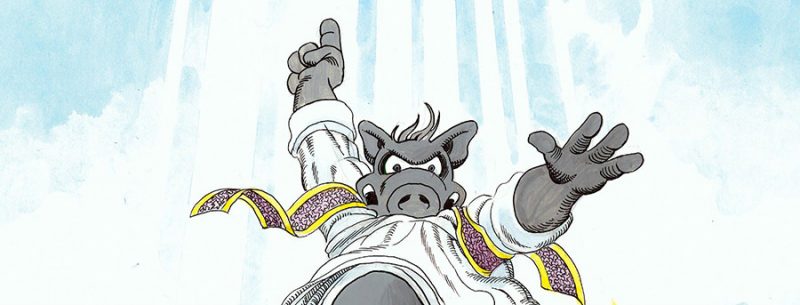
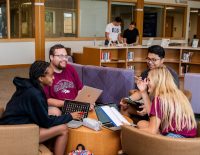
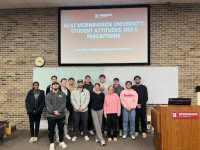

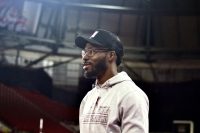
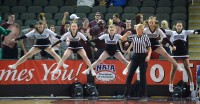
Leave a Reply